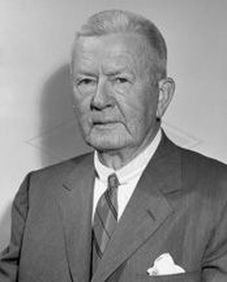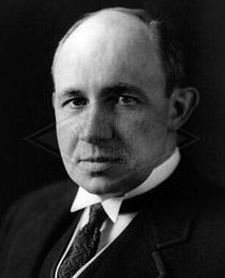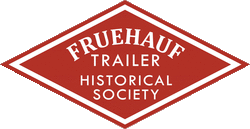Alphons B. Landa Corporate Raider
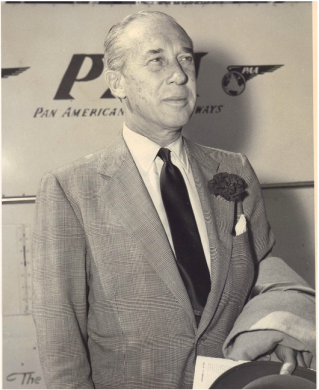 Alphons B. Landa
Alphons B. Landa
Sometime around 1945 Roy Fruehauf met a man who would become perhaps his greatest ally, a Washington attorney named Alfonso Howard Beaumont Landa.
Landa came from a socially prominent Hispanic family in Chicago. Born in 1896, he grew up with numerous financial advantages. Following the death of his parents he was left with $200,000 to help him decide what he wanted to do with his future.
Landa joined the Washington law firm, Davies, Richberg, Tydings, & Duff. in 1926, where he became a partner. He found that his greatest expertise lay in working with large corporations, and specializing in proxy battles. Psychology of the human mind, or more appropriately the corporate mind, was employed as a strategy in his cases giving him a great advantage. Studying psychology under Sigmund Freud in Vienna gave him an opportunity to polish these skills. His law degree obtained through George Washington University gave him the remaining tools he needed to earn his proxy king status.
Joseph E. Davies, a senior partner of the firm, mentored Landa. Davies advised many presidents and served as ambassador to the Soviet Union, Belgium and Luxembourg. Through these connections, Davies was able to guide Landa’s rise in the political world, opening doors in Washington and the White House. As a staunch Democrat, Davies was instrumental in the campaign to get Franklin D. Roosevelt into the Presidency during the 1932 election campaign. Later, joining in Davies’ efforts, Landa would take on very successful fund-raising activities for Roosevelt’s 1937 inauguration.
Landa came from a socially prominent Hispanic family in Chicago. Born in 1896, he grew up with numerous financial advantages. Following the death of his parents he was left with $200,000 to help him decide what he wanted to do with his future.
Landa joined the Washington law firm, Davies, Richberg, Tydings, & Duff. in 1926, where he became a partner. He found that his greatest expertise lay in working with large corporations, and specializing in proxy battles. Psychology of the human mind, or more appropriately the corporate mind, was employed as a strategy in his cases giving him a great advantage. Studying psychology under Sigmund Freud in Vienna gave him an opportunity to polish these skills. His law degree obtained through George Washington University gave him the remaining tools he needed to earn his proxy king status.
Joseph E. Davies, a senior partner of the firm, mentored Landa. Davies advised many presidents and served as ambassador to the Soviet Union, Belgium and Luxembourg. Through these connections, Davies was able to guide Landa’s rise in the political world, opening doors in Washington and the White House. As a staunch Democrat, Davies was instrumental in the campaign to get Franklin D. Roosevelt into the Presidency during the 1932 election campaign. Later, joining in Davies’ efforts, Landa would take on very successful fund-raising activities for Roosevelt’s 1937 inauguration.
Prominent Partners in Washington Law Firm, Davies, Richberg, Tydings, Landa and Duff
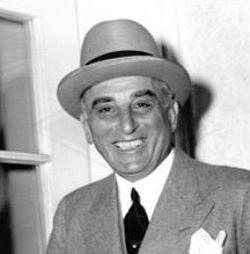 Joseph Edward Davis
Joseph Edward Davis
Joseph Edward Davies November 29, 1876 – May 9, 1958 was an American lawyer and diplomat. He was appointed by President Wilson to be Commissioner of Corporations in 1912, and First Chairman of the Federal Trade Commission in 1915. He was the second Ambassador to represent the United States in the Soviet Union and U.S. Ambassador to Belgium and Luxembourg.
From 1939 to 1941 Davies was Special assistant to Secretary of State Hull, in charge of War Emergency Problems and Policies. From 1942 through 1946 he was Chairman of President Roosevelt's War Relief Control Board. Ambassador Davies was Special Advisor of President Harry Truman and Secretary of State James F. Byrnes with rank of Ambassador at the Potsdam Conference in 1945.
From 1939 to 1941 Davies was Special assistant to Secretary of State Hull, in charge of War Emergency Problems and Policies. From 1942 through 1946 he was Chairman of President Roosevelt's War Relief Control Board. Ambassador Davies was Special Advisor of President Harry Truman and Secretary of State James F. Byrnes with rank of Ambassador at the Potsdam Conference in 1945.
|
James Henderson Duff
(January 21, 1883 – December 20, 1969) was an American lawyer and politician. A member of the Republican Party, he served as United States Senator from Pennsylvania from 1951 to 1957. He previously served as the 34th Governor of Pennsylvania from 1947 to 1951. |
Donald Randall Richberg July 10, 1881 - November 27, 1960 was an American attorney, civil servant, and author who was one of President Franklin D. Roosevelt's key aides and who played a critical role in the New Deal. He co-wrote the National Industrial Recovery Act, was general counsel & executive director of the National Recovery Administration. He co-authored the Railway Labor Act, the Norris-LaGuardia Act, and the Taft-Hartley Act.
|
Landa's Advantageous Marriages
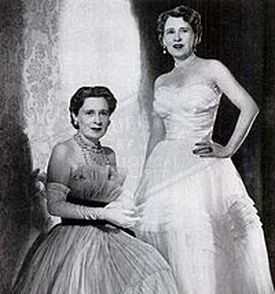 Gloria Morgan Vanderbilt & Thelma, Viscountess Furness
Gloria Morgan Vanderbilt & Thelma, Viscountess Furness
Landa, married multiple times, was referred to by Diana B. Henriques as the "oft divorced Landa." Among his list of spouses, he connected with Washington’s diplomatic society with his marriage to his first wife, Marjorie, the daughter of former Wyoming Congressman Franklin Wheeler Mondell. Mondell served in Congress from 1895 to 1897, and again from 1899 to 1923.
Landa and Marjorie Mondell were married in 1930. The newlyweds would spend their honeymoon on the Riviera in one of Landa’s homes. They were divorced in 1942.
His marriage to Laura Consuelo ‘Connie’ Morgan Thaw advanced his social connections to men of wealth and power. Connie Thaw came from money and the kind of blue blood society that Landa aspired. Self-made, Landa had achieved recognition and its financial rewards on his own merit. Among other vocations and titles at that time he was President of Colonial Airlines.
Landa was Ms. Thaw’s third husband, while she became the second Mrs. Landa. The ceremony took place in Beverly Hills, Los Angeles, California on May 11, 1942. Connie Morgan was the older sister of celebrated twins, Thelma and Mercedes. Thelma became the mistress of King Edward VIII while married to Marmaduke Furness, 1st Viscount Furness.
Mercedes Morgan changed her name to Gloria, just before she married Reginald Claypoole Vanderbilt. Reginald was heir to the Vanderbilt railroad fortune. Gloria’s husband died two years after their marriage, leaving their only child, daughter Gloria, with a $2.5 million trust fund. Daughter Gloria became the well-known fashion designer Gloria Vanderbilt.
Landa and Marjorie Mondell were married in 1930. The newlyweds would spend their honeymoon on the Riviera in one of Landa’s homes. They were divorced in 1942.
His marriage to Laura Consuelo ‘Connie’ Morgan Thaw advanced his social connections to men of wealth and power. Connie Thaw came from money and the kind of blue blood society that Landa aspired. Self-made, Landa had achieved recognition and its financial rewards on his own merit. Among other vocations and titles at that time he was President of Colonial Airlines.
Landa was Ms. Thaw’s third husband, while she became the second Mrs. Landa. The ceremony took place in Beverly Hills, Los Angeles, California on May 11, 1942. Connie Morgan was the older sister of celebrated twins, Thelma and Mercedes. Thelma became the mistress of King Edward VIII while married to Marmaduke Furness, 1st Viscount Furness.
Mercedes Morgan changed her name to Gloria, just before she married Reginald Claypoole Vanderbilt. Reginald was heir to the Vanderbilt railroad fortune. Gloria’s husband died two years after their marriage, leaving their only child, daughter Gloria, with a $2.5 million trust fund. Daughter Gloria became the well-known fashion designer Gloria Vanderbilt.
Alphons Landa is prominently featured in Diana B. Henriques expose, "The White Sharks of Wall Street" 1950-60's
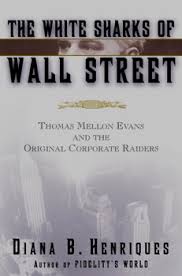 The White Sharks of Wall Street
The White Sharks of Wall Street
"In her absorbing, if occasionally meandering work, Henriques demonstrates that while today's multibillion-dollar deals may be larger in scope than those acquisitions pulled off by Thomas Mellon Evans (a distant relative of the Pittsburgh Mellons) and his contemporaries in the 1950s and '60s, the history of corporate power plays in American business is almost as old as the nation itself. Henriques follows a group of men, Evans among them, who have changed the landscape of America's largely passive corporate culture to one devoted to efficiency and generating value for shareholders. Evans acquired his first company, H.K. Porter, in 1939, and bought about 80 companies, many through proxy fights, before retiring from corporate life. His constant wheeling-and-dealing brought him in contact with other power brokers of the day, such as Lou Wolfson, Leopold Silberstein and Robert Young who helped reshape the business world. Henriques (Fidelity's World) is at her best when she evokes Evans's colorful life, from his rise as a young orphan to his death in 1997, covering his three marriages, his passion for art and his relationship with his three sons (one of whom took over Macmillan Publishing until he lost it in a hostile takeover by Robert Maxwell). In a narrative that is part biography, part business history, Henriques engagingly documents some of America's most charismatic and controversial businessmen, who laid the groundwork for the more recent "greed is good" era".
From Publishers Weekly Copyright 2000 Reed Business Information, Inc.
From Publishers Weekly Copyright 2000 Reed Business Information, Inc.
Landa, Corporate Defender becomes Corporate Raider
In a July 7, 1958 Time Magazine article, Art Landa was dubbed the Proxy King. Landa had earned a reputation for his expertise in corporate law. One of Landa’s greatest assets was his ability to protect large companies from unfriendly takeovers initiated by corporate raiders. Raiders profit by preying on under valued companies. Landa specialized in defending these vulnerable targets. Eventually Landa transitioned into the role of raider himself. After attaining national prominence in the Fruehauf-Kolowich battle, Landa went on to take up cudgels against Leopold Silberstein in Penn-Texas Corporation.
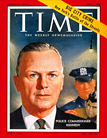 July 7, 1958 Time Magazine
July 7, 1958 Time Magazine
July 7, 1958 Time Magazine - The Proxy King
"The current king of the proxy fighters is a tough-talking, dapper Washington lawyer named Alfons Landa, who admits that his role in more than half a dozen battles has made him "as popular as a skunk." Last week Landa, 60, won his biggest battle by unseating pudgy Leopold Silberstein, 54, from the sick Penn-Texas Corp., taking over as president at $36,000 a year. (Silberstein will collect $40,000 a year for five
years as an 'adviser.') "Read more
"The current king of the proxy fighters is a tough-talking, dapper Washington lawyer named Alfons Landa, who admits that his role in more than half a dozen battles has made him "as popular as a skunk." Last week Landa, 60, won his biggest battle by unseating pudgy Leopold Silberstein, 54, from the sick Penn-Texas Corp., taking over as president at $36,000 a year. (Silberstein will collect $40,000 a year for five
years as an 'adviser.') "Read more
Fruehauf Trailer Company becomes a client
Harvey Fruehauf called upon Alfons Landa to handle various legal matters for the Fruehauf Trailer Company. In May 1945 Harvey had a member of his corporate legal counsel prepare a Syndicate Agreement. It was drawn up for the purpose of purchasing and selling Coca-Cola stock. Letters regarding the Agreement were found in Roy’s personal files, with correspondence drafted by Landa who reviewed the document before it was signed. The Agreement included not only Harvey and his wife and their three children as participants, but it also included Roy. It was only one of numerous business ventures the brothers would share. Harvey named himself as manager of the Syndicate, with Power of Attorney.
Harvey was Landa’s main client at Fruehauf Trailer Company, until Roy ascended to the presidency. As was fitting, for Landa, his new priority was to follow and guide Roy Fruehauf through his various business dealings. For Roy, Landa proved to be a useful advisor in financial matters, and by the first half of the 1950s Roy would find himself in need of those skills to save Fruehauf Trailer Company.
By 1951 Fruehauf had invited Landa to join the board.
Harvey was Landa’s main client at Fruehauf Trailer Company, until Roy ascended to the presidency. As was fitting, for Landa, his new priority was to follow and guide Roy Fruehauf through his various business dealings. For Roy, Landa proved to be a useful advisor in financial matters, and by the first half of the 1950s Roy would find himself in need of those skills to save Fruehauf Trailer Company.
By 1951 Fruehauf had invited Landa to join the board.

